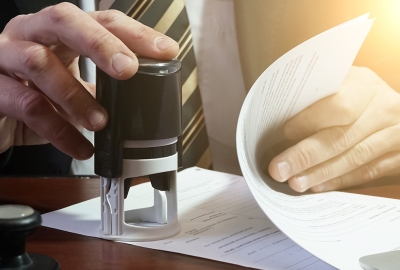Real Estate Transactions Continue With New COVID-19 Conscious Procedures
The real estate community in Massachusetts and beyond is working diligently to proceed with transactions as seamlessly as possible while adapting to the new reality that Coronavirus (COVID-19) has imposed. The following are several COVID-19 changes impacting the transfer of real property in Massachusetts:
Registries of Deeds
All of the registries of deeds and registry districts of the land courts in Massachusetts have adjusted their public availability and recording protocols. The Real Estate Bar Association (REBA) is actively maintaining a list advising of current information for all 21 of the Massachusetts registries here. Though the procedures differ between locations, generally those wishing to record or register documents should assume they are not permitted to conduct closings at the registry. As it relates to registered land, the land court has halted all non-emergency processes. It is suggested that parties should allow for extra time in transactions to mail in documents if at all possible and provide detailed instructions with their documents to be recorded or filed. Many registries have instituted drop off only policies or are requiring you to call ahead to schedule appointments to drop off documents. Some registries are only accepting e-filings. Please contact us if you need assistance with e-filing as it requires an account. Some registries are closed entirely. If you need assistance in one of these districts, please contact us so that we can advise you on how to proceed.
Title Insurance
Most title insurance companies have instituted gap coverage on owner?s and loan policies in cases where the closure of a registry or land court, or delays due to new procedures implemented due to COVID-19, prevents the timely recording or filing of a document. This means that the title insurance agent issuing the policies can insure the transaction (for owners, this means insuring your ownership of the property; for lenders, this means insuring a mortgage) despite the inability to record documents at the registry. There are several steps an agent will be required to follow in these situations. Please reach out to us if you have questions on insuring the gap and we can assist you in our capacity as both real estate attorneys and title insurance agents.
Purchase and Sale Agreement Language for Delays Caused by COVID-19
REBA has provided Provisional Purchase and Sale force majeure language available here to address excused delays impacting the ability to conduct closings, including those specifically related to COVID-19. We recommend this temporary provision be added to all purchase and sale agreements to protect all parties in the event that unavoidable delays occur.
Smoke Certificate Inspections
REBA has also issued a Provisional Purchase and Sale Form for Temporary Conditional Deferral of Smoke Certificate Inspections, available here. In the event that parties are unable to obtain a certificate from the fire department as legally required when transferring ownership of property certifying that smoke and carbon monoxide detectors are compliant, this temporary provision allows for the responsibility for installing these detectors to pass to the buyer, and for seller funds to be escrowed at closing in order for seller to reimburse buyer to cover costs associated with obtaining the required certificate once the deferral of inspections is lifted. We recommend this temporary provision be added to all purchase and sale agreements.
Other Closing Requirements
Among other things, water meter readings, Title V reports, municipal lien certificates, home inspections, permits and certificates of occupancy will be more difficult to obtain due to the far-reaching impacts of COVID-19. We are happy to provide information specific to your scenario upon request.
Appraisal and Employment Verification Requirements
The Federal Housing Finance Agency (FHFA) has directed Freddie Mac and Fannie Mae to allow use of appraisal alternatives in an attempt to reduce the need for appraisers to conduct interior property inspections of homes for mortgages through May 17, 2020. FHFA has also directed that if lenders cannot obtain verbal verification of a borrower?s employment, they are permitted to obtain email verification from the employer, a recent year-to-date paystub from the borrower, or a bank statement showing a recent payroll deposit.
1031 Exchanges
The National Association of Realtors sent a letter on March 17, 2020 to the United States Department of the Treasury and the Internal Revenue Service requesting regulatory relief as to the deadlines for 1031 like-kind exchanges, most notably the 180-day deadline for completing exchanges and the 45-day period for identifying possible properties as exchange candidates. We await further guidance on relief related to 1031 exchanges, but we note that similar relief has been granted in past cases of presidentially declared disasters.
Realtors
The Massachusetts Association of Realtors has provided guidance to all real estate agents that brick-and-mortar offices should close in order to comply with Governor Baker?s executive order, but that realtors can continue to conduct business remotely. Open houses are frowned upon as agents are being instructed to obey the Governor?s order limiting gatherings to 10 persons or less. All CDC guidance on social distancing and other COVID-19 related protocols should be followed.
Disclaimer: This summary is provided for educational and informational purposes only and is not legal advice. Any specific questions about these topics should be directed to attorney Sarah Wegman.


